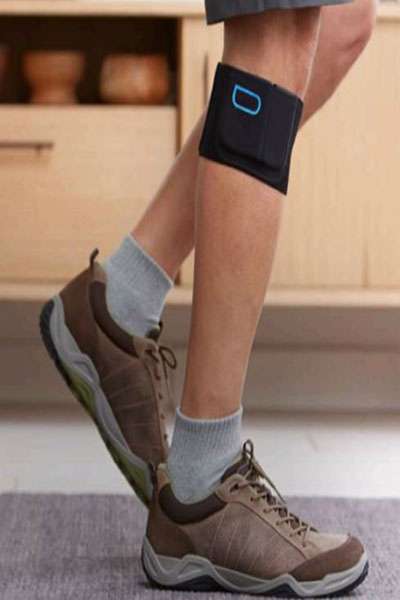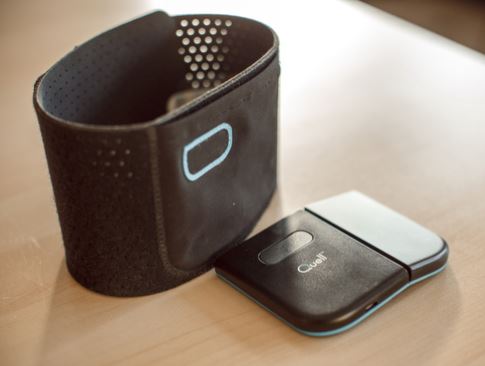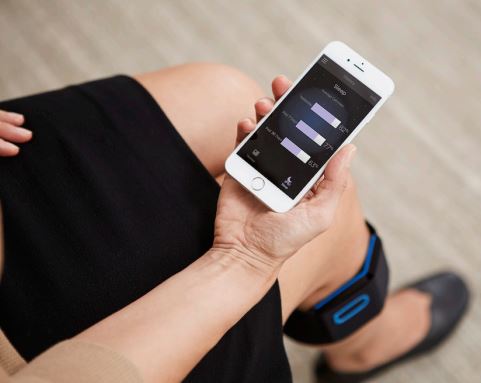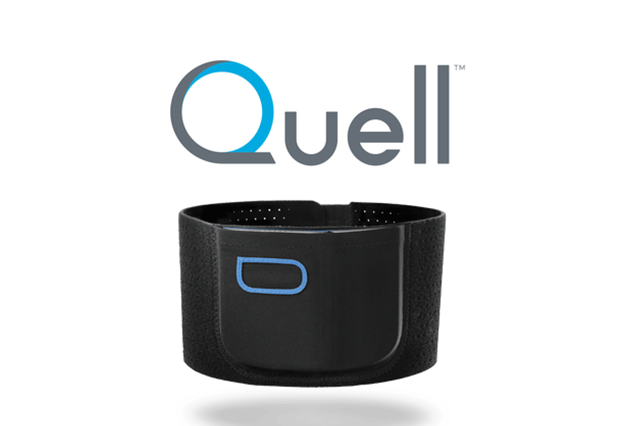A DRUG-FREE WAY TO RELIEVE PAIN

Quell is a wearable device that uses electrical stimulation to trigger the release of endogenous opioids in the brain, a natural pain-relief response. Users wear the thin, belt-like device on the upper calf, as the area has a high concentration of nerves. By changing the amount of sensory nerves activated by the device, users can feel and control different levels of pain relief. A Quell starter kit, which includes the device, a sports band and a one-month supply of electrodes, sells for $249.

The device was developed by NeuroMetrix, a Massachusetts-based healthcare innovation company. It can be used to treat many chronic pain conditions, such as nerve, arthritic, back, leg and foot pain. The biggest benefit of the Quell system is that it provides prescription-strength pain relief without any of the usual side effects of chemical-based pain relievers.
The device has been cleared by the FDA, and can relieve pain for up to 30 hours on a single charge. Thanks to its delicate design, users can hide the wearable underneath their clothes.

The Quell system is the second-generation, over-the-counter version of SENSUS, a prescription pain management device that NeuroMetrix released in 2013. The designers kept the earlier device’s core technology, but incorporated some updates, such as Bluetooth capability and an activity-tracking smartphone app. Its built-in Bluetooth technology tracks users’ therapy and sleep trends, and an accelerometer can adjust therapy levels according to users’ daily activities.
WELL POSITIONED TO COMPETE IN
THE $5 BILLION PAIN-MANAGEMENT-DEVICE MARKET
The Quell system provides a noninvasive, drug-free, over-the-counter solution that is unique to the marketplace. It is well positioned at the intersection of medical wearable devices and consumer-grade wearables. The device’s wearability and effectiveness make it attractive to hundreds of millions of consumers who are in need of pain relief.
The Quell device has huge market potential. According to a study by market research firm Global Industry Analysts, the global market for pain-management devices is projected to reach $5.3 billion in 2020, driven by an aging population and an increase in degenerative diseases. In the US alone, there will be about 157 million people affected by chronic pain by 2020. The Atlanta Medical Clinic estimates that $61.2 billion worth of productive time is lost due to chronic pain conditions in the US each year. The US is the biggest market for pain-management devices, followed by Asia and Latin America.

 Quell is a wearable device that uses electrical stimulation to trigger the release of endogenous opioids in the brain, a natural pain-relief response. Users wear the thin, belt-like device on the upper calf, as the area has a high concentration of nerves. By changing the amount of sensory nerves activated by the device, users can feel and control different levels of pain relief. A Quell starter kit, which includes the device, a sports band and a one-month supply of electrodes, sells for $249.
Quell is a wearable device that uses electrical stimulation to trigger the release of endogenous opioids in the brain, a natural pain-relief response. Users wear the thin, belt-like device on the upper calf, as the area has a high concentration of nerves. By changing the amount of sensory nerves activated by the device, users can feel and control different levels of pain relief. A Quell starter kit, which includes the device, a sports band and a one-month supply of electrodes, sells for $249.
 The device was developed by NeuroMetrix, a Massachusetts-based healthcare innovation company. It can be used to treat many chronic pain conditions, such as nerve, arthritic, back, leg and foot pain. The biggest benefit of the Quell system is that it provides prescription-strength pain relief without any of the usual side effects of chemical-based pain relievers.
The device has been cleared by the FDA, and can relieve pain for up to 30 hours on a single charge. Thanks to its delicate design, users can hide the wearable underneath their clothes.
The device was developed by NeuroMetrix, a Massachusetts-based healthcare innovation company. It can be used to treat many chronic pain conditions, such as nerve, arthritic, back, leg and foot pain. The biggest benefit of the Quell system is that it provides prescription-strength pain relief without any of the usual side effects of chemical-based pain relievers.
The device has been cleared by the FDA, and can relieve pain for up to 30 hours on a single charge. Thanks to its delicate design, users can hide the wearable underneath their clothes.
 The Quell system is the second-generation, over-the-counter version of SENSUS, a prescription pain management device that NeuroMetrix released in 2013. The designers kept the earlier device’s core technology, but incorporated some updates, such as Bluetooth capability and an activity-tracking smartphone app. Its built-in Bluetooth technology tracks users’ therapy and sleep trends, and an accelerometer can adjust therapy levels according to users’ daily activities.
The Quell system is the second-generation, over-the-counter version of SENSUS, a prescription pain management device that NeuroMetrix released in 2013. The designers kept the earlier device’s core technology, but incorporated some updates, such as Bluetooth capability and an activity-tracking smartphone app. Its built-in Bluetooth technology tracks users’ therapy and sleep trends, and an accelerometer can adjust therapy levels according to users’ daily activities.